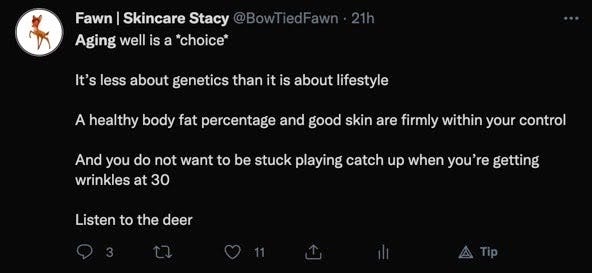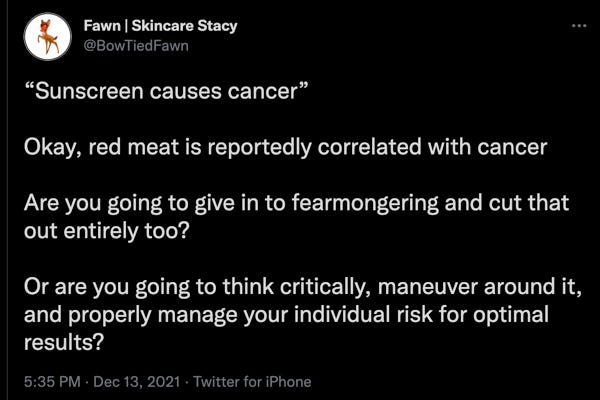As skin is the largest organ in your body, access to a dermatologist should be as simple as going to see your PCP.
Unfortunately, the way the American medical system is set up, this isn’t the case.
Between the complexities of health insurance and propaganda from the makeup and plastic surgery industries, it can be difficult to know what’s fact and what's fiction when it comes to skincare.
Enter Fawn, Skincare Stacy.
I’m here to demystify the science of skin, break down the marketing paid to influence you by skincare and makeup companies, and enable you to make decisions about your personal health and aesthetics.
If you don’t already have a skincare routine, now is the time to start. Just like with overall health, prevention is key with skin.
Ignore any messaging that aging gracefully or poorly is solely a product of your genetics.
I assure you, it isn’t.
Aging well is firmly within your control.
You have agency here, and I’m going to teach you how to leverage it.
You should know how to structure a skincare routine that suits your needs.
Because the skin on your face is thinner and more sensitive than the rest of the body, it requires extra care.
At baseline, your skincare routine should include three steps:
Facial cleanser
Moisturizer
Facial SPF
Everyone's skin is different, so I can't provide blanket recommendations.
This is why you need to be able to tweak the above three categories to suit your specific skin type, skin conditions, lifestyle, and preferences.
So, let’s talk about it!
Step 1: Facial Cleanser
You can find my list of preferred cleanser for every skin type here.
Based on your lifestyle, you should cleanse your face 1-2x per day.
For my individual needs with dry skin, I typically tweak this slightly as follow:
In the summers: I wash my face with water or a gentle cleanser in the morning, cleanse with benzoyl peroxide after the gym, and use the same gentle cleanser before bed
In the winters: I wash my face with water in the morning, cleanse with benzoyl peroxide after the gym, and wash with water or a gentle cleanser at night
You may wish to avoid bar soaps as the ingredients can be too harsh for your face.
Instead, consider opting for a facial-specific cleanser.
General guidelines for choosing a facial cleanser:
If you have dry skin: look for words like “hydrating” or “gentle”
If you have oily skin: look for words like “foaming” or “refreshing”
If you have normal or combination skin, you can test any of the above to see how your skin reacts
If you’re acne-prone, consider a benzoyl peroxide cleanser (note: BP can bleach fabric, and I wouldn't go with more than 4% once per day)
If you have blackheads on your noise, consider a salicylic acid cleanser or a leave-on serum
Note: you gotta use a gentle moisturizer afterwards if you’re going to use a leave-on serum!
Avoid products like facial scrubs as these have small, hard pieces in them that can create microtears in your skin
Also, I’ve said this before, and I’ll say it again: avoid washing your face in the shower.
Also, remember that you don’t have to keep using the same cleanser.
You can have two different cleansers at a time if they’re doing different things (like me!), and you can always try a new product after you finish the first one if you weren’t thrilled with it.
Step 2: Moisturizer
This is the moisturizer I’m using right now; it’s so lightweight that you can use it on both your face and body.
Whether face or body, day or night, after you cleanse your skin, you should be moisturizing.
Moisturizing is essential to skin health and allows us to replenish our skin barrier with lipids after stripping away the oil and dirt that have built up.
Your skin is your largest organ and is constantly shedding the the top layer, so we must take extra care to protect the skin barrier.
By keeping your skin properly moisturized, you reduce the chances of skin cracking and subsequent infection, negate development of premature wrinkles, and create that youthful, healthy glow that enhances your attractiveness.
Moisturizing is essential in the winter, but also not to be neglected in the summer.
General guidelines here:
In summer, or if you have oily skin, I'd recommend a moisturizing lotion or gel
Fair warning: some people love that gel, and some people hate it *shrug*
In winter, or if you have a dry skin, I'd recommend a thicker moisturizer like a cream or double layer of lotion
Like with the cleanser, you’ll want to opt for a face-specific moisturizer as products made solely for the body are likely to clog your pores contributing to future breakouts.
I have dry, acne-prone skin, so I'm partial to layering hyaluronic acid (a humectant) and lotion in the winter.
Step 3: Facial SPF (during the day, not night)
This one's controversial, I know.
I'll do a whole deep dive on SPF and aging later, but in my opinion:
Facial SPF is the best tool we have to prevent aging of the face, neck, and hands.
You’ve probably seen headlines like “sunscreen causes cancer” all over holistic Twitter.
What people (including myself, at first) fail to realize is that this sensationalized headline comes from a manufacturing error and that the carcinogen under suspicion (benzene) was never intended to be in the formula.
My thoughts on this topic are ever-evolving.
There are two classes of sunscreens: chemical and physical (or mineral).
My preference is physical sunscreens instead as these tend to be less irritating than chemical.
Here are general guidelines:
SPF 30+ (blocks ~97% of UV radiation)
Broad spectrum (blocks UVA and UVB)
Physical sunscreen (can identify this by looking for “zinc oxide” or “titanium oxide” in the ingredients list)
Wait a few minutes for moisturizer to absorb first so you’re applying on dry skin
For my readers of color, physical sunscreens can leave a white-cast on darker skin tones from the oxides.
For this reason, I recommend looking for tinted SPF, and check the reviews to see if someone with your skin type approved.
You may need to try a few different products to find one that works best for you.
UV radiation does not stop in the winter or on cloudy days.
For maximum protection from aging, I wear facial SPF every day.
Furthermore, I often wear a hat to protect my face in the summer.
Now, I know what you’re thinking - what about vitamin D absorption?
Way ahead of you.
Yes, it’s true that SPF does inhibit vitamin D synthesis by blocking broad-spectrum sunlight, and vitamin D is crucial for holistic health.
To get around this, I only wear it on my face and hands daily, and I still go outside to get plenty of sun on parts of my body where my skin is thicker (and therefore more resistant to aging).
I also eat a vitamin D rich diet and supplement.
Because I am a holistic health maxi, I get a blood panel done every year, and I have no vitamin D deficiency.
In my opinion, no other topical anti-aging ingredient will be as effective as it could be if you were leveraging SPF.
This is because, given our modern lifestyles, we spend more time than ever getting sunlight through windows.
Windows block UVB rays but not UVA.
Plus you’re getting straight blue light from your laptop all day.
Therefore, you’re not getting any of the proposed benefits of the protective nature of broad spectrum sunlight and all of the damage.
In conclusion, SPF usage is personal.
It is up to you to exercise agency and manage your individual risk.
Even if you prefer to avoid using it at all, just do me a favor and don’t get burned, okay?
Skin cancer is scary - I want you to live forever and look great doing it.
So there you have it!
The very basics of a facial skincare routine that everyone should adopt to keep their skin looking beautiful for decades to come.
Fun fact - anything you do to your face, you can also reasonably do to your neck and hands!
I’m partial to wearing extra spf on my hands in the summer and extra moisturizer in the winter.
If you enjoyed reading this post, be sure to subscribe and check out some of my most popular content:
Cheers,
Note: you can now book consultations with me! Check it out here or DM me on Twitter to book with ETH.
If you enjoyed this article check out Doc Anarchy and BowTiedFawn’s Substacks.










Read many of your articles and curious about your views on toner? What do you make of the pH argument and need post-cleanser / pre-treatment. Thanks
Any good lotions for dry feet?